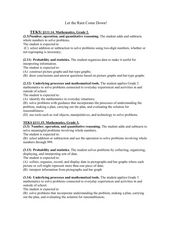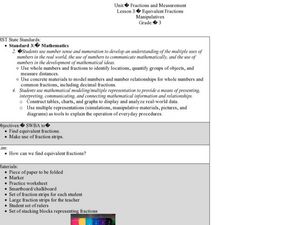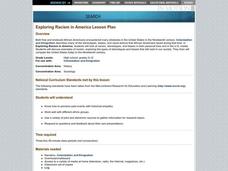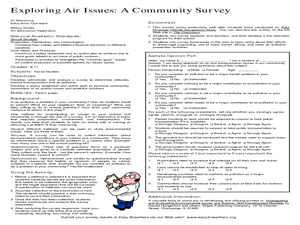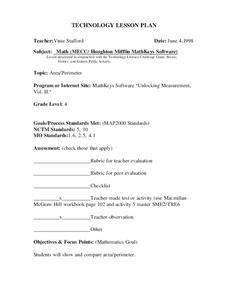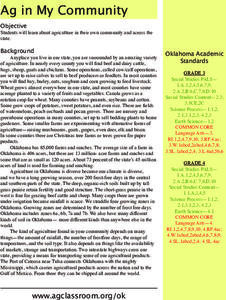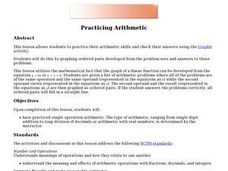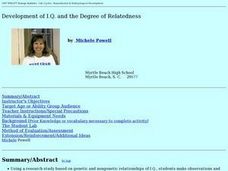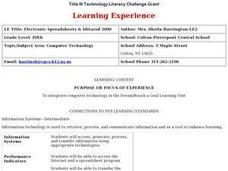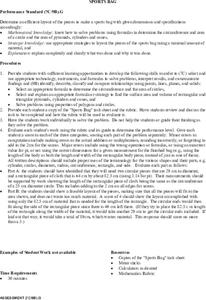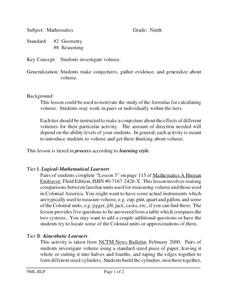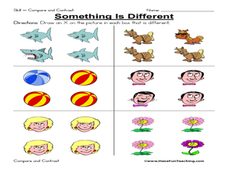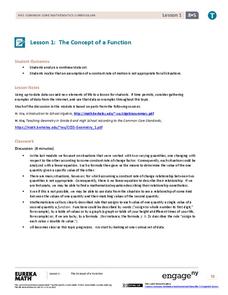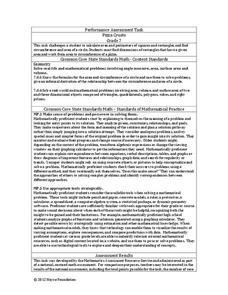Curated OER
Frozen, Canned or Fresh?
Students compare spinach. In this Science lesson, students construct an experiment to test fresh, frozen, and canned spinach taste and texture. Students record their findings in charts and graphs.
Curated OER
Let the Rain Come Down!
Second graders construct a bar graph comparing local precipitation to that of the Yucatan. In this graphing lesson plan, 2nd graders will use conversions and problem solving strategies.
Curated OER
Slavery Issue And Views North Versus South Around 1850s
Tenth graders compare and contrast the opinions of northerners and southerners about the issue of slavery in the 1850's. They study how the legislation that was enacted by Congress addressed the issues. As they investigate, they create a...
Curated OER
Equivalent Fractions Manipulatives
Young scholars study fractions. In this equivalent fractions instructional activity, students utilize fraction strips to enhance their understanding of equivalent fractions. They watch a demonstration and then work independently with...
Curated OER
Exploring Racism in America
Students compare racism today to racism that existed during the nineteenth century. As a field research project, students individually keep track of examples of racism, biases, and stereotypes illustrated throughout the US media over a...
Curated OER
Exploring Air Issues
Students collects survey data from their community on air pollution. In this environmental science lesson, students consider the opinion of the community on air pollution and create a plan to reduce it. Students plan on creating a...
Curated OER
Area And Perimeter
Fourth graders investigate the concepts of area and perimeter, and they practice finding the values in various types of situations. They construct different representations of shapes using the area measurements and also explain the...
Curated OER
Soils, Water and Erosion
Students participate in a hands-on experiment to compare how water and soil erosion affect soil and grass. They determine how slope affects erosion and how terracing affects erosion. They write a paragraph summarizing their data.
Curated OER
Agriculture
Students examine the types of agriculture in their own state and in their local community. They examine how food makes it to their local grocery store. They compare data from different states.
Curated OER
Practicing Arithmetic
Students practice single operation arithmetic ranging from single digit addition to long division of decimals or real numbers using Graphit. They use data sets and rules to graph ordered pairs.
Curated OER
Causal Patterns in Density Phenomena
Students define density as a relationship. Through experimentation, they explore the association between the mass and volume of pure substances. Students create a data plot and analyze the patterns between mass and volume. Students...
Curated OER
Development of I.Q. and the Degree of Relatedness
Studnets, in groups, analyze data regarding genetic and nongenetic relationships of I.Q. They make observations and discuss correlations from a diagram. Cooperative learning teams discuss a given set of questions and present information...
Curated OER
Intensity of Light
Learners discover the relationship between the brightness of a light and the distance from the light. They identify two different ways of looking at the brightness of a light, how luminous light is and how illuminated an object is....
Curated OER
Electronic Spreadsheets & Iditarod 2000
Students use the Internet for gathering information for Iditarod race journals. They use a spreadsheet program for entering data and making charts for showing changes in speeds achieved over a period of four weeks in timed writings in...
Curated OER
Sports Bag
Young scholars determine an efficient layout of the pattern pieces needed to make a sports bag with given dimensions and specifications. Given a word problem, data set and a diagram, students evaluate the information they have available...
Curated OER
Nineteenth Century Family Portraits
Students compare two nineteenth century family portraits using historical data, statistics, and historical context. Students analyze their own family pictures adjusting the criteria to the current decade. Lastly students study the...
Curated OER
Living Corn Necklace
Sixth graders complete an experiment to learn about hereditary traits. In this hereditary traits lesson, 6th graders discuss similarities and differences in corn and complete charts for their discussion. Students then use a dent corn and...
Curated OER
Investigating Volume
Ninth graders investigate and make conjectures about volume. For this geometry lesson, 9th graders analyze data and predict the outcome. They calculate volume using different tiers.
Curated OER
Something is Different: Same/Different
In this different/same worksheet, student draw an X on the picture in a box that is different from the others, 6 sets total. A reference web site is given for additional activities.
Curated OER
Character and Class
Students connect photographic images with the literary texts of Eudora Welty and William Faulkner. They identify and distinguish narrators and protagonists of literary works. Students recognize patterns of social class as a literary...
EngageNY
The Concept of a Function
Explore functions with non-constant rates of change. The first installment of a 12-part module teaches young mathematicians about the concept of a function. They investigate instances where functions do not have a constant rate of change.
Center for Learning in Action
Investigating Physical and Chemical Changes
Super scientists visit ten stations to predict, observe, and draw conclusions about the physical and chemical changes that occur when different states of matter—liquid, solid, and gas—are placed under a variety of conditions. To...
Noyce Foundation
Pizza Crusts
Enough stuffed crust to go around. Pupils calculate the area and perimeter of a variety of pizza shapes, including rectangular and circular. Individuals design rectangular pizzas with a given area to maximize the amount of crust and do...
Curated OER
Eyes On Me
Students investigate the human eye. In this biology lesson, students read the book Look At Your Eyes and locate the various parts of their eye. Students play the game "I Spy."



